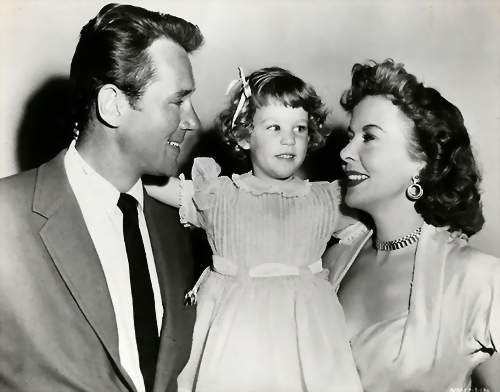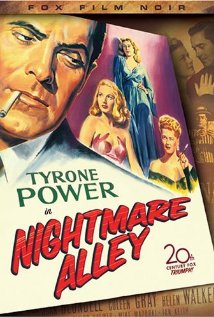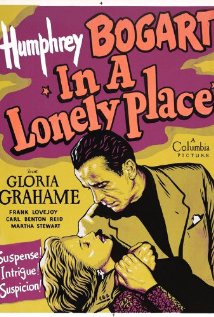I am very pleased to announce that I have programmed a series for the Will & Ariel Durant Library in Hollywood called Women in Film Noir. The series runs in March to honor Women’s History Month. We are highlighting women’s contribution to the genre at a time when there were many barriers to working outside the home.

Ida Lupino juggled work and family. Shown: Ida with her husband Howard Duff and their daughter, Bridget, who was born in 1952.
The library will screen five films, starting March 2.
I will be giving a talk at the library at 1 p.m. Saturday, March 7. The opening night double feature is a spotlight on Ida Lupino, actress, director, writer and producer.
5 p.m. March 2: “On Dangerous Ground” (1951, 82 min.): Ida Lupino plays a blind country girl who lives with her brother. She meets a psychologically scarred cop (Robert Ryan) when her brother becomes a suspect in a murder. With a taut script by A. I. Bezzerides (“Kiss Me Deadly”) and moody, poetic direction from Nicholas Ray, “On Dangerous Ground” is an unforgettable film noir.
 “The Hitch-Hiker” (1953, 71 min.): Fate isn’t smiling when two guys on vacation give a lift to a man who turns out to be serial killer. “The Hitch-Hiker,” starring Edmond O’Brien, Frank Lovejoy and William Talman, is the only classic film noir directed by a woman, the great Ida Lupino. Best known as an actress, Lupino was also a director, writer and producer. She co-wrote “The Hitch-Hiker.”
“The Hitch-Hiker” (1953, 71 min.): Fate isn’t smiling when two guys on vacation give a lift to a man who turns out to be serial killer. “The Hitch-Hiker,” starring Edmond O’Brien, Frank Lovejoy and William Talman, is the only classic film noir directed by a woman, the great Ida Lupino. Best known as an actress, Lupino was also a director, writer and producer. She co-wrote “The Hitch-Hiker.”
5 p.m. March 9: “Nightmare Alley” (1947, 110 min.) A film noir set in the seedy world of a carnival, “Nightmare Alley” tracks an ambitious performer (Tyrone Power) as he pursues a better life. Crucial to his rise and fall are three women: Joan Blondell, Coleen Gray and Helen Walker. Unusual for time, Walker plays an upper-class working woman who is not a teacher, nurse or secretary.
Based on William Lindsay Gresham’s novel and directed by Edmund Goulding, “Nightmare Alley” is unusually cerebral and rich with subtext. Also unusual for that time: Barbara McLean served as editor – by 1947, many women had been pushed out of film editing jobs, despite the fact that in the early days of the industry they dominated that function.
 5 p.m. March 16: “Strangers on a Train” (1951, 101 min.) With standout performances from Robert Walker and Farley Granger, “Strangers” stands as an excellent example of Alfred Hitchcock’s subversive casting. The film is based on the novel of the same name by master of suspense Patricia Highsmith. Czenzi Ormonde (aka Gladys Lucille Snell) co-wrote the script with Raymond Chandler. Pat Hitchcock plays a small but memorable part.
5 p.m. March 16: “Strangers on a Train” (1951, 101 min.) With standout performances from Robert Walker and Farley Granger, “Strangers” stands as an excellent example of Alfred Hitchcock’s subversive casting. The film is based on the novel of the same name by master of suspense Patricia Highsmith. Czenzi Ormonde (aka Gladys Lucille Snell) co-wrote the script with Raymond Chandler. Pat Hitchcock plays a small but memorable part.
5 p.m. 23: “In a Lonely Place” (1950, 94 min.) Based on a novel by Dorothy B. Hughes, “In a Lonely Place” tells the story of a screenwriter (Humphrey Bogart) and an actress (Gloria Grahame) who live in the same Hollywood apartment building and fall in love. All is not well, however, when it seems the writer might also be a deranged killer. Masterfully directed by Nicholas Ray and edited by Viola Lawrence, sometimes called “Hollywood’s first lady film cutter.”
The Durant Library is at 7140 W. Sunset Blvd. (one block west of La Brea), Los Angeles, CA 90046, 323-876-2741.










From FNB readers